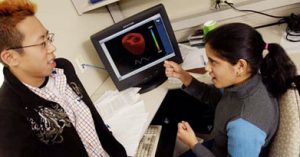Pre-Doctoral Training Program in Computational Medicine
 The Pre-Doctoral Training Program in Computational Medicine, funded by the National Institute of General Medical Sciences under Award Number T32GM119998, supports selected trainees from the departments of Biomedical Engineering and Applied Mathematics & Statistics.
The Pre-Doctoral Training Program in Computational Medicine, funded by the National Institute of General Medical Sciences under Award Number T32GM119998, supports selected trainees from the departments of Biomedical Engineering and Applied Mathematics & Statistics.
Students chosen for this Ruth L. Kirschstein National Research Service Award institutional training grant will learn through a combination of focused coursework and dissertation research alongside computational medicine training program faculty mentors from across the Johns Hopkins Whiting School of Engineering and the School of Medicine. The program is designed to prepare graduates to fill the growing need for researchers trained in computational medicine in both industry and academia.
Trainees will be part of an exceptional and distinctive community of students and Training Program Faculty exploring the possibilities of computational medicine. Trainees will learn how to develop models of biological systems in health and disease, constrain these models using data collected from patients, and apply models to deliver improved diagnoses and therapies.
Prospective trainees should apply to the PhD programs of the Departments of Biomedical Engineering or Applied Mathematics and Statistics, indicating an interest in pursuing predoctoral training in Computational Medicine.
Program Milestones
In addition to the requirements of your home department’s PhD program, you have the following commitments as a member of the training program in computational medicine:
- 18 credit hours of computational medicine electives prior to degree completion.
-
Course Number Course Title Credits EN.540.621 Project in Design: Pharmacodynamics 3 EN.540.632 Project in Design: Pharmacokinetics 3 EN.553.650 Computational Molecular Medicine 4 EN.580.631 Introduction to Computational Medicine: Imaging 2 EN.580.633 Introduction to Computational Medicine: The Physiome 2 EN.580.639 Models of the Neuron 4 EN.580.640 Systems Pharmacology and Personalized Medicine 4 EN.580.647 Computational Stem Cell Biology 3 EN.580.664 Introduction to Data Science for Biomedical Engineering 4 EN.580.680 Precision Care Medicine I 4 EN.580.681 Precision Care Medicine II 4 EN.580.688 Foundations of Computational Biology and Bioinformatics 4 EN.580.691 Learning, Estimation, and Control 3 EN.580.697 Neuro Data Design 3 EN.580.743 Advanced Topics in Genomic Data Analysis 3 EN.580.745 Mathematics of Deep Learning 1.5 EN.520.621 Introduction to Nonlinear Systems 3 EN.520.622 Principles of Complex Networked Systems 3 EN.520.632 Medical Imaging Systems 3 EN.540.639 Advanced Topics in Pharmacokinetics and Pharmacodynamics 3 EN.601.647 Computational Genomics: Sequences 3 EN.601.648 Computational Genomics: Data Analysis 3 EN.601.675 Machine Learning 3 EN.601.676 Machine Learning: Data to Models 3 EN.601.682 Machine Learning: Deep Learning 3 EN.601.749 Computational Genomics: Applied Comparative Genomics 3
-
- Responsible Conduct of Research (AS.360.625) or SOM equivalent (must be in-person)
- At least one rotation in a lab of Training Program Faculty.
- A significant collaboration with a clinician-researcher who works with patient data.
- Advanced Seminars in Computational Medicine (EN.580.735) – includes attending ICM Distinguished Seminar Series and Computational Medicine Journal Club*
- Attendance at annual ICM Retreat*
* As you are considered a participant in this program for the entirety of your PhD training, these obligations and opportunities continue beyond the end of your one-year appointment.


